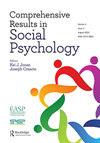Does reference to COVID-19 improve climate change communication? Investigating the influence of emotions and uncertainty in persuasion messages
引用次数: 1
Abstract
Global climate change and the COVID-19 pandemic that are among the most pressing societal crises share multiple links. It has been shown for instance, that the measures to fight against the coronavirus may impact (at least for a while) greenhouse gas emissions. Moreover, the COVID-19 can serve as a prototypical example for climate change, demonstrating how global crises may become personally relevant and certain. Here, our aim was to investigate whether explicit reference to the COVID-19 crisis in communication messages on global climate change could enhance message effectiveness. Through two pre-registered studies (Ntotal = 651), we examined whether the use of factual elements stressing the certainty dimension of the COVID-19 pandemic (Study 1) or the use of arguments linking COVID-19 and climate change framed in terms of “positive” or “negative” outcomes (Study 2) could impact the effectiveness of climate messages. Results did not show that messages aiming to increase the certainty of the climate crisis by linking it to the COVID-19 pandemic increased perceived message effectiveness. However, we have found that emotional framing influenced perceived message effectiveness, but not pro-environmental behaviour. Results are discussed in terms of the impact of the concepts of certainty, message framing and emotions on climate change communication. [ FROM AUTHOR] Copyright of Comprehensive Results in Social Psychology is the property of Routledge and its content may not be copied or emailed to multiple sites or posted to a listserv without the copyright holder's express written permission. However, users may print, download, or email articles for individual use. This may be abridged. No warranty is given about the accuracy of the copy. Users should refer to the original published version of the material for the full . (Copyright applies to all s.)提及COVID-19是否能改善气候变化沟通?调查情绪和不确定性对说服信息的影响
全球气候变化和COVID-19大流行是最紧迫的社会危机,它们之间存在多重联系。例如,研究表明,抗击冠状病毒的措施可能会(至少在一段时间内)影响温室气体排放。此外,2019冠状病毒病可以作为气候变化的一个典型例子,表明全球危机如何与个人相关和确定。在这里,我们的目的是调查在关于全球气候变化的沟通信息中明确提及COVID-19危机是否可以提高信息的有效性。通过两项预先注册的研究(Ntotal = 651),我们检验了使用强调COVID-19大流行确定性维度的事实要素(研究1)或使用以“积极”或“消极”结果框架将COVID-19与气候变化联系起来的论据(研究2)是否会影响气候信息的有效性。结果并未表明,旨在通过将气候危机与COVID-19大流行联系起来来增加气候危机确定性的信息提高了感知信息的有效性。然而,我们发现情绪框架影响感知信息的有效性,但不影响亲环境行为。研究结果讨论了确定性、信息框架和情绪概念对气候变化传播的影响。《社会心理学综合结果》的版权归Routledge所有,未经版权所有者的书面许可,其内容不得被复制或通过电子邮件发送到多个网站或发布到listserv。但是,用户可以打印、下载或通过电子邮件发送文章供个人使用。这可以删节。对副本的准确性不作任何保证。用户应参阅原始出版版本的材料的完整。(版权适用于所有人。)
本文章由计算机程序翻译,如有差异,请以英文原文为准。
求助全文
约1分钟内获得全文
求助全文
来源期刊

Comprehensive Results in Social Psychology
Psychology-Social Psychology
CiteScore
3.40
自引率
0.00%
发文量
7
 求助内容:
求助内容: 应助结果提醒方式:
应助结果提醒方式:


